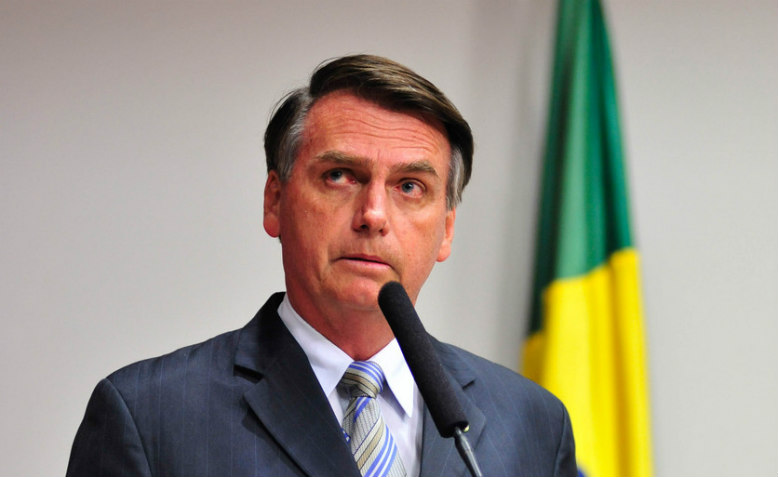 Hard right presidential candidate Jair Bolsonaro, 3 September 2014. Photo: Wikimedia Commons
Hard right presidential candidate Jair Bolsonaro, 3 September 2014. Photo: Wikimedia Commons
The media present today’s Brazilian elections as a special case but, argues Vladimir Unkovski-Korica, Brazil’s troubles reflect the troubles of the world economy
Today will see Brazil hold elections at multiple levels including at the level of the presidency. The elections are the first following three years of recession which cost the country ten percent of its GDP and pushed millions into poverty.
The capitalist media across the western world are trying hard to spin a story about these elections. They have two major claims. In the words of one article in the Wall Street Journal, “Brazil has suffered boom-and-bust cycles and political instability since independence from Portugal in 1822.”
Well, that’s all right then, it’s just the way it’s always been. The same article implies that the reason for the latest downturn is that the now jailed former leftist president, Luiz Inacio Lula da Silva, convicted for corruption, built an unsustainable welfare model based on high export prices of raw materials.
When these crashed, so did Brazil’s economic model, we are told, and business confidence is key to the present and the future: “Companies, meanwhile, are holding back their spending as they await the result of the election. Their restored confidence will be needed if Latin America’s largest economy is to return to faster growth.”
In almost Cold War style, establishment media lament the lack of centrists who could provide the right incentives for this mythical business engine of growth. They often imply that, controversial as he is, right wing former army captain, Jair Bolsonaro, is preferable to Lula’s “hand-picked successor”, Fernando Hadad.
One article in the Council on Foreign Relations informs us that “some” fear Bolsanaro is nostalgic for Brazil’s years of military dictatorship, and that “Bolsonaro’s commitment to free-market reforms is untested” – but presumably that would be preferable to the policy agenda of “the left-wing Workers’ Party, which many accuse of turning a blind eye to corruption during its thirteen years in power”.
The establishment’s preference for a “Trump of the Tropics” – who had three decades of congressional experience and therefore falsely presents himself as anti-establishment – should hardly come as a surprise. The establishment has always preferred the right, even though it is sometimes embarrassed by the right’s candidates.
But the lack of truthful reporting about the causes of Brazil’s ills is breath-taking. Marxist economist Michael Roberts has argued that Brazil’s problems are in many ways typical of many developing countries, even though it has the highest public debt ratio among the so-called emerging economies. Yet a faltering private sector and tax dodging by big business were more to blame than high pensions.
Many developing states lived off high commodity prices or took out cheap loans while western banks were in desperate search for profitable investment, as profit rates were falling in the more advanced economies in the 2000s in particular. Such problems beset much of Latin America, India, South Africa, Turkey and Russia.
The situation is likely to get worse with the developing trade war between the US and China. And with the US Federal Reserve increasing interest rates, stemming the tide of cheap credit that was used to bail out the banks after 2008, the cost of servicing debts held in dollars is only likely to increase. On top of that, according to the schedule of debt repayment, it is next year that the developing economies will see a peak in payment terms, just as conditions are getting worse.
Were they collectively to renege on paying their debts, these countries would likely bring the western banking system down and with it the fragile stability of the long depressed global capitalist system. But this is why their right wing elites are favoured in western capitals – they prefer to remain wedded to their donors while they make their populations pay for the privilege.
Despite this, there will be serious doubts about whether the global capitalist elites will be able to weather the next storm of the financial crisis. Corporate debt levels are at record highs after the cheap credit bonanza after 2008 made it bad business for them too not to take out huge loans.
And with the big capitalist powers at odds in a way they have not been for several generations, it’s anyone’s guess how the situation would play itself out. It is highly unlikely we would see the kind of concerted global intervention we saw after 2008.
That is why it is important for the left to raise anti-debt campaigns globally and be ready to call for nationalisation under workers’ control of the banking system. Next time, we have to be ready to take on the power of the rich – if we don’t, they’ll get away, literally and metaphorically, with murder.

